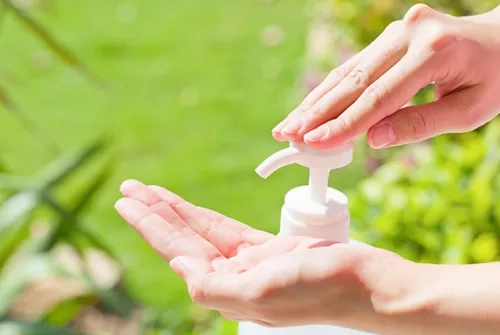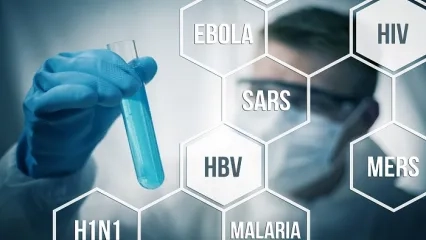Alo Yeditepe
Alo Yeditepe
Hand Sanitizer Usage Guide
Many people turned to disinfectants, colognes, and masks to protect themselves from the coronavirus, which is also seen in Turkey. The interest has grown so much that these products have been sold out in almost all pharmacies and websites after the statement of Health Minister Fahrettin Koca. So, what do we know about the correct use of preferred products despite the exorbitant prices? What do hand sanitizers do? Do disinfectants completely kill viruses? Is disinfectant prepared at home? Should a protective mask be used against the virus?
Yeditepe University Hospitals Infectious Diseases and Clinical Microbiology Specialist Prof. Dr. Meral Sönmezoğlu answered frequently asked questions.
What Are Hand Sanitizers Good For? How Does the Disinfection Mechanism Work?
When there is visible or invisible contamination, hand sanitizer is used to prevent disease-causing microorganisms from contaminating our own bodies or other people and surfaces. Alcohol-based hand sanitizers are the most commonly and safely used.
What Percentage of Alcohol Should Hand Sanitizers and Colognes Contain to Have an Effect Against the Virus? Can We Use All the Disinfectants in the Market? What Criteria Should We Consider When Purchasing Disinfectant?
Because alcohol-based hand sanitizers evaporate very quickly, they usually kill most microorganisms within 2 to 5 seconds. Alcohol-based disinfectants that we use in hospitals are disinfectants with adjusted alcohol content and printed expiration dates. The substances we call cologne used at home are chemicals that contain 70 percent and above alcohol and have disinfectant properties between 70 and 90 percent. Since the alcohol content of the colognes that have been left open will evaporate quickly, their disinfectant properties may decrease. For this reason, they are chemicals that have disinfectant properties between 60 and 90 percent, provided that the caps of large-volume disinfectants and household colognes are tightly closed.
While Some Disinfectants Have a Stronger and More Specific Odor, Others May Contain Perfume. Which One Should We Trust?
We should not smell any disinfectant while disinfecting our hands because it can be harmful to the respiratory tract due to its content. Therefore, there is no benefit to it being perfumed. This is not a reason for preference.
How is Hand Sanitizer Applied Effectively? What is the Method?
To be effective, it needs to fill the palm and should be spread by rubbing between the fingers on the palm and the outside of the hand, including the wrists. Since it can evaporate in a very short time and kill bacteria and viruses within 2 seconds, it must be spread quickly on the hand.
Do Disinfectants Completely Eliminate the Virus?
Most disinfectants are effective against enveloped viruses. They are effective in most viruses and non sporing bacteria that cause disease in humans, such as HIV, Hepatitis B, influenza, or coronavirus.
Who Should Use Masks and When? Is It Better To Use Masks Only When Sick Or When Not Sick But Want Protection?
It has not been shown that there is a benefit to using masks in general for coronavirus protection. Face masks are protective materials that are recommended for people who are sick to wear when they come into contact with others. It is recommended that healthcare workers who will encounter many patients in hospitals wear face masks. It is recommended that healthcare professionals who come in close contact with patients who are likely to be infected with COVID-19, take samples from them, or come in close enough contact to operate such as a tracheostomy (making a hole leading to the windpipe surgically) wear N95 masks that also block very small particles.
About
Faculty and Year of Graduation:
Medical Faculty of Ankara University, 1984
”
See Also
- Infections Common in Hot Weather
- What is Hepatitis B? What are its symptoms? How is it Transmitted?
- What is HMPV Virus? HMPV Symptoms and Ways of Transmission
- Why Is the Flu Lasting Longer This Year?
- What is West Nile Virus? What are the Symptoms and how is it Transmitted?
- Viral Hepatitis and Prevention Methods
- What Precautions Should Be Taken Against the Cold Epidemic?
- Don't Be Late Fighting Against Diseases
- Antibiotics Kill Beneficial Bacteria, Not Viruses
- What is Hepatitis? What are the Symptoms and Treatment Methods?
- Symptoms and Treatment of Tick Bites
- Summer Infections
- Precautions Must Be Taken Against Loss of Life Due To Infection in Thalassemia
- Information on H1N1 (Swine Flu)
- Summer is Coming... Beware of food poisoning!
- Office Hygiene: The Most Common Areas Where Microbes are Found in the Office
- Our Taboos Affect the Increase in the Number of HIV-Positive Cases in Turkey
- Strep A Symptoms and Treatment
- Do Not Put a Cigarette Butt or Pour Olive Oil or Liquid Soap on the Tick
- Reheat the Food You Cooked Only Once!
- HIV Can Be Hidden for 10 Years without Any Symptoms!
- 290 Million People Live Without Knowing They Have Hepatitis
- Things to Consider When Touching Meat at Eid
- What Is Anthrax Disease?
- The Way to Fight AIDS is to Raise Awareness First
- Still Not Too Late For Flu Vaccine
- What is Rhinovirus?
- Fighting with Thalassemia: Meral Yılmaz
- Thalassemia Spreads from the Mediterranean to the Whole of Europe with Migration!
- Early Treatment of Crimean Congo Hemorrhagic Fever is Vital
- Approximately 3 Million Patients Need Blood Transfusions Every Year in Turkey
- When to Get the Flu Vaccine
- Antibiotics Account For 14% of Prescription Costs
- West Nile Virus Replaces Malaria
- It Is Necessary to Try to Be Healthy in order to Be Protected
- A New Flu Outbreak is Expected Every 10 Years
- 63% of Vector-Borne Diseases are Caused by Lyme Disease
- Experts Warn About Flu Risk
- Mosquito Infection Risk
- Why aren’t Antibiotics Working Any More?
- The World Raises an “Alarm” on Antibiotic Resistance!
- What is COVID-19?
- The Mask Requirement was Removed and the Importance of Social Distance Increased!
- How to Prevent COVID-19 in School-Going Children
- WHO (World Health Organization) Warns for Antibiotic Resistance!
- Who Is Threatened by Monkeypox?
- Ways to Prevent Coronavirus
- Swine Flu / H1N1
- Life Returns to Normal with Caution
- What is Monkeypox Virus? What Are the Symptoms of the Monkeypox Virus?
- What is Lyme Disease?
- How to Tell if You Have a Mild Coronavirus?
- Pay Attention to These Rules for COVID-19
- The Priority Rule for the Protection from Summer Infections is Hygiene
Alo Yeditepe





